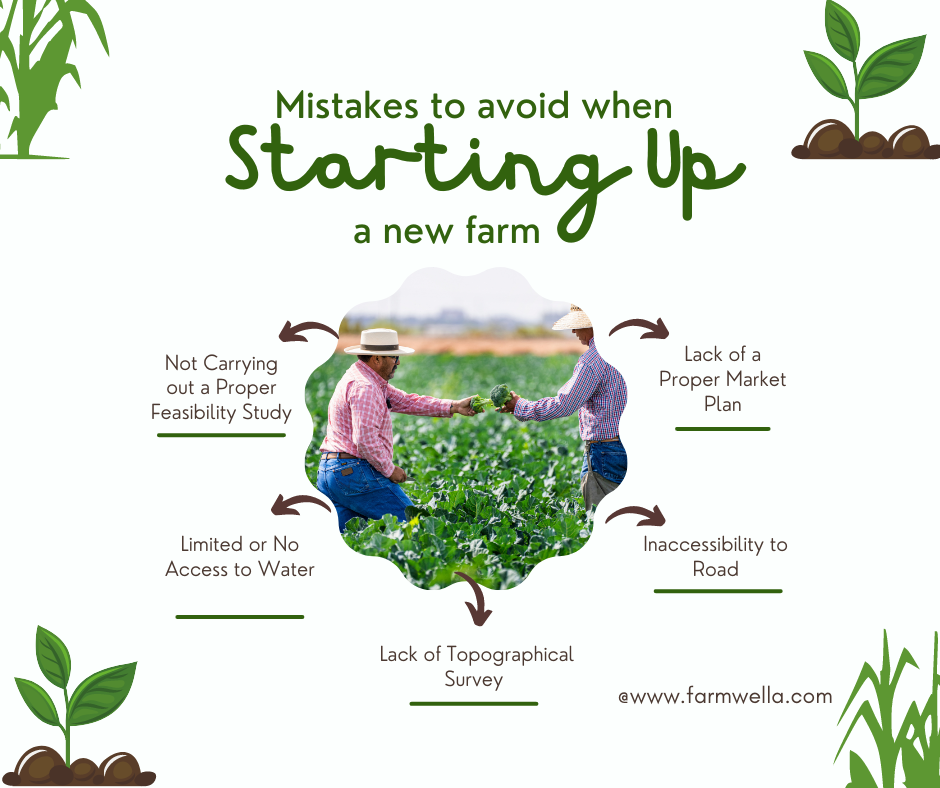
Agriculture is among the most significant businesses to venture into in the world. It is therefore not surprising that many people wish to establish a farm as a company.
Starting a new farm can be difficult, especially for someone who has little to no experience with farm establishment. Once you get the hang of it, getting into agriculture is really straightforward, but it will require a ton of preparation to truly get off the ground.
Remember, there truly is no right or wrong reason to desire to establish a farm company, no matter what your motivations are for doing so.
Similar to any other business, you must keep certain things in mind. These include your business strategy, finances, marketing, and other factors you need to consider when starting a new business.
No matter what type of farming you are venturing into, there are common mistakes you should avoid when starting up a new farm if you want to achieve productivity. The following are the mistakes you should watch out for:
Not Carrying out a Proper Feasibility Study
For any business you wish to start, including agriculture, you have to conduct a feasibility study. It is germane for any business that wishes to thrive.
A feasibility study will assist you in determining the chances of a prospective farm’s success. It will also assist in evaluating a variety of criteria, including expense and whether the laid-out plan would be advantageous to your farm in the long run.
Most importantly, a feasibility study will help determine whether your target market is in the region where your farm is located.
Feasibility studies assist in the identification of operational details, prospective challenges, market analysis, and the quantity and source of capital required for the expansion of the farm when it finally kicks off operations.
There are several sorts of feasibility studies, including technical feasibility, legal feasibility, operational feasibility, and economic feasibility, each with its own distinct function.
Inaccessibility to Road
The location of the farm is hardly put into consideration because many farmers believe it has little or no effect on agricultural operations. This is a simple but common mistake that can affect the productivity and the output of your farm.
Studies have revealed that agricultural growth is frequently related to road accessibility and that places near roads are more likely to exhibit development than areas further away.
Both the target market and the farm workers should have easy access to the farm for a smooth farm operation. Additionally, it will make it easier to transport harvested farm produce and farm inputs to and from the farm.
Limited or No Access to Water
The most significant water usage globally is reportedly in agriculture. Water is a crucial prerequisite for farmers to boost production and sustainably expand the farm’s food supply.
You cannot afford to ignore the importance of the proximity of water to the farm when preparing to set up your farm because it is a necessary input for agricultural development and is crucial to food security.
You should also always have a backup plan for water, although it is best to locate your farm near a natural source of water, such as a river or a dam.
If you don’t locate your farm where there is access to water, you can wind up spending more on irrigation systems.
Lack of Topographical Survey
The topography of a region designed for farming is crucial to take into account since the placement of agricultural fields in relation to topographical slope or gradient significantly affects water management, tillage difficulties, and possible soil erosion.
The angle of the slope will be a significant influence in deciding how much water will be retained. The angle of the slope can determine the survival of the crops.
Slope can be a significant production-limiting issue. In undrained or steep locations, the topsoil can be quickly eroded and will disintegrate. Essential plant nutrients will be washed away because water will run down the hill quickly without being held in the soil. Therefore, the crops are severely hampered
5. Lack of a Proper Market Plan
A good marketing plan will help you define pricing objectives, assess production and price risk, identify and quantify expenses, and design a marketing strategy for your crop. The major goal of the marketing strategy is to minimize risk and assist in its management.